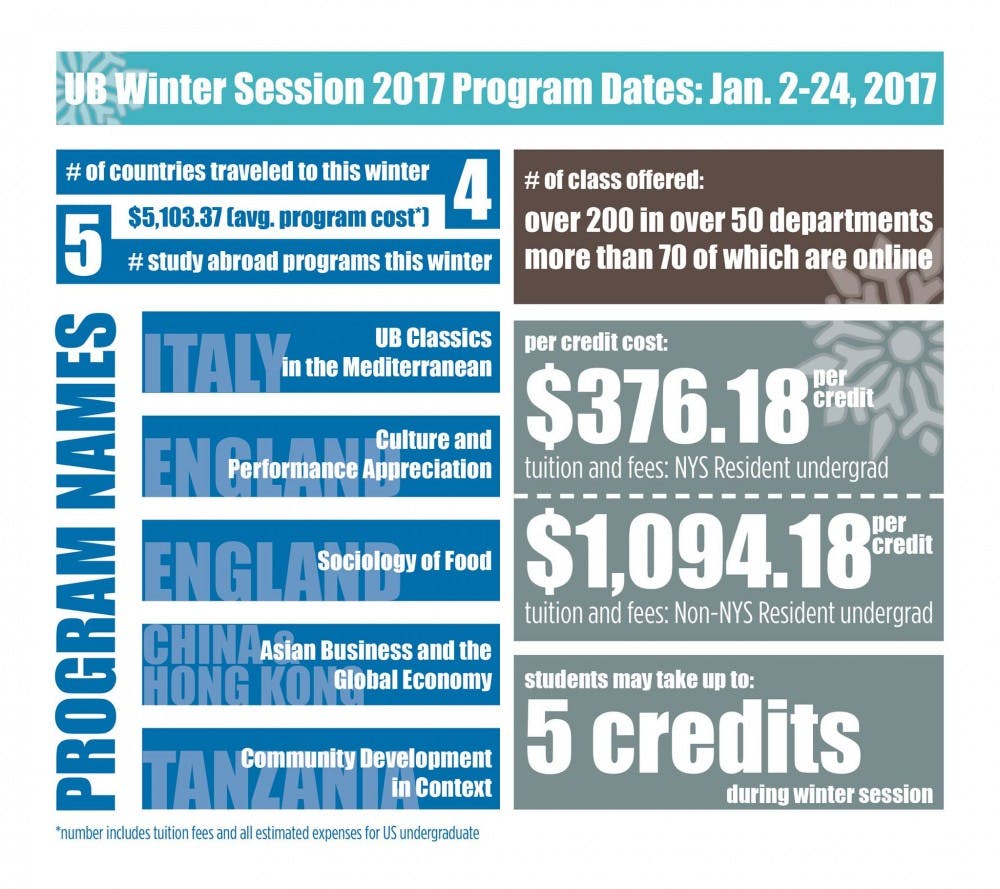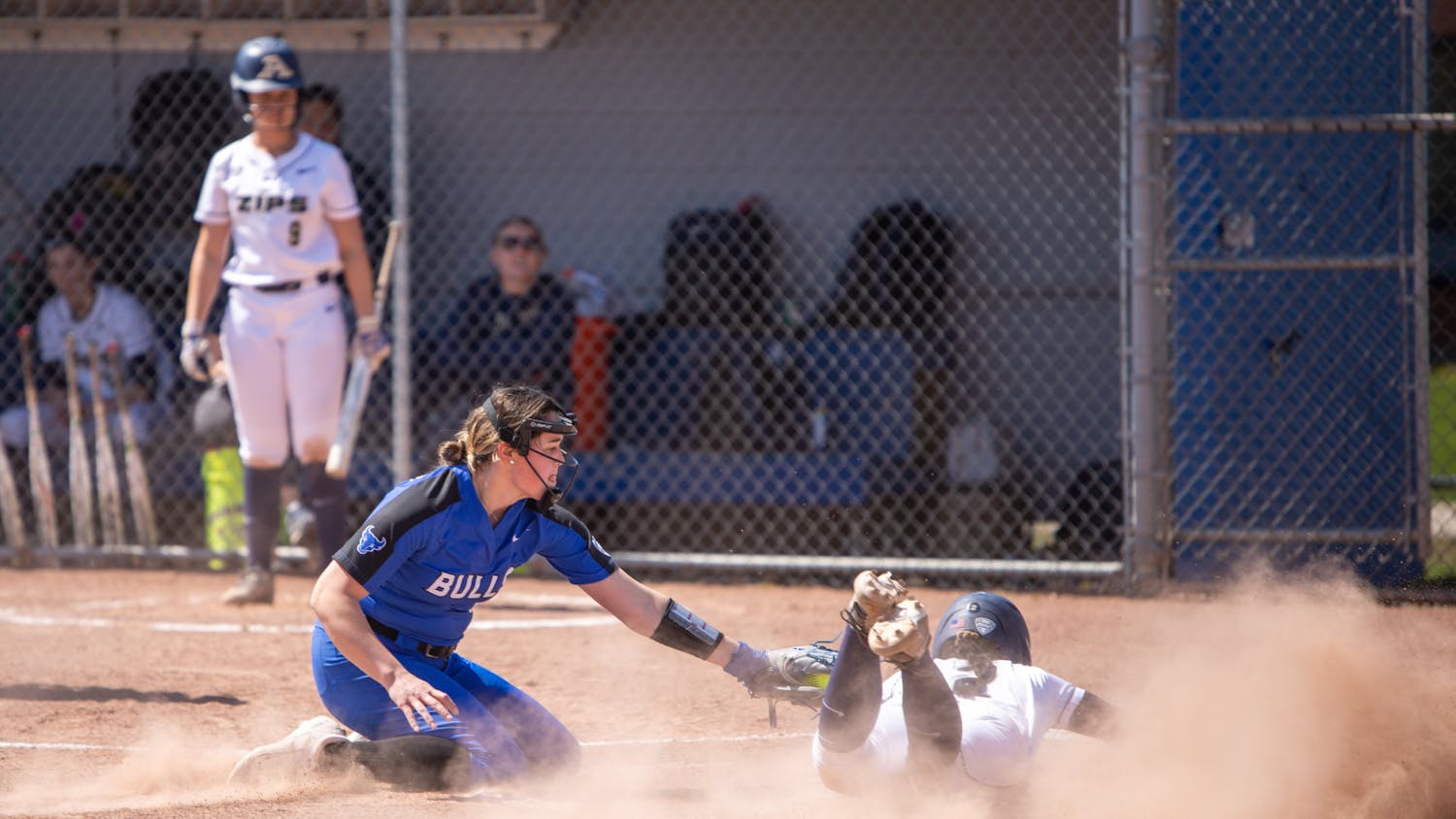Students who don’t plan on going home over winter break can learn the sociology of food, take a pop culture class or visit a new country.
UB’s winter session branded as UBThisWinter will run from Jan. 4 to 24. Students will have the opportunity to enroll in physical and online classes up to 5 credits, study abroad and participate in other programming and experiential learning.
This winter, UB students can participate in more than 200 classes within over 50 different departments. Over 70 of the offered courses will be online, while the rest will take place on campus.
Courses range broadly in topic, from “Business Ethics” (MGG 495) to “Mental Health in Pop Culture” (SW 115).
Kira Love, director of Transfer Experience and Summer/Winter Sessions, said winter sessions are fairly new. The sessions began three years ago during the winter 2014.
“Students are able to earn [up to five academic credits] within three weeks... a student is able to use the winter session to get ahead, or go on something like a study abroad that they maybe wouldn’t have a chance to do during the semester,” Love said.
Love also said that if a student needs to repeat a course or take one to get caught up, they are able to do so during this time.
Fall and spring registration for certain widely-taken prerequisites courses gives priority to students who have not previously taken them. These courses are labeled as controlled enrollment courses and include classes like ECO 181 and 182, UGC 111 and 112 and CHE 101 and 102. Students can often only repeat controlled enrollment courses during summer and winter sessions.
New York State resident undergraduate students will have to pay $376.18 per credit in tuition and fees for winter classes, while non-resident undergraduates will pay $1,094.18 per credit. Therefore, an in-state undergraduate will pay $1,128.54 for a typical three-credit class during the three-week winter session.
“Winter classes can be really helpful for a student who just needs to take 1 or 2 classes to graduate at a certain time, but they are incredibly expensive, so you have to make sure to weigh the pros and cons if you’re going to take one,” said Mackenzie Davis, a senior business administration major.
For students concerned about the costs of winter programming, Love’s advice is to make sure to speak with your financial aid advisor.
“Sometimes, students are able to use their financial aid to help cover some of the costs,” she said.
In addition to taking classes, students have the opportunity to participate in short term study abroad programs over the winter session.
Though most applications for this winter’s study abroad programs have been closed and finalized, students have the opportunity every winter to study abroad and take classes in a foreign country.
UB offers a number of their own winter study abroad programs, and this year, they will be sending students to four countries via five different programs.
“UB Classics in the Mediterranean” will send students to explore Italy, while “Culture and Performance Appreciation” and “Sociology of Food” will expose them to the offerings of England.
“China and Hong Kong Business Environment” will introduce students to the financial markets of China and its special administrative region, Hong Kong. Finally, the “Korea University” program will allow students to study their choice of topic in Seoul, South Korea’s capital city.
UB’s study abroad programs this winter range between approximately two to three weeks, with an average program length of 19 days.
Though students may consider winter study abroad valuable, it is certainly not free.
The average program cost for an undergraduate New York State resident is $5,103.37, including program tuition, fees and all estimated expenses along with airfare, housing and meals.
For students who want to study abroad but are not interested in any of the above programs, UB offers credit to those who study abroad through a program offered by another SUNY campus, as well as a number of non-SUNY programs.
As of Friday, Dec. 2, the SUNY Study Abroad website listed 34 winter programs.
Alexis Ogra, a junior history major, believes winter study abroad to be an opportunity that can be uniquely valuable for many students.
“I think one of the most useful parts of the winter session is the opportunity to study abroad for a short period of time,” Ogra said. “I have a lot of classes that I have to take on campus and can’t really study abroad for a full semester, but with winter study abroad, I can still fulfill my interests in traveling to a different part of the world.”
In addition to taking classes and studying abroad, students also have the opportunity to choose from winter “experiential learning” offerings including alternative winter break programming, career development learning opportunities provided by Career Services and other research and services opportunities.
The best resources for winter session program information are academic advisors, the UBThisWinter website and the UB Study Abroad website, according to Love.
Jimmy Corra is a news staff writer and can be reached at news@ubspectrum.com





